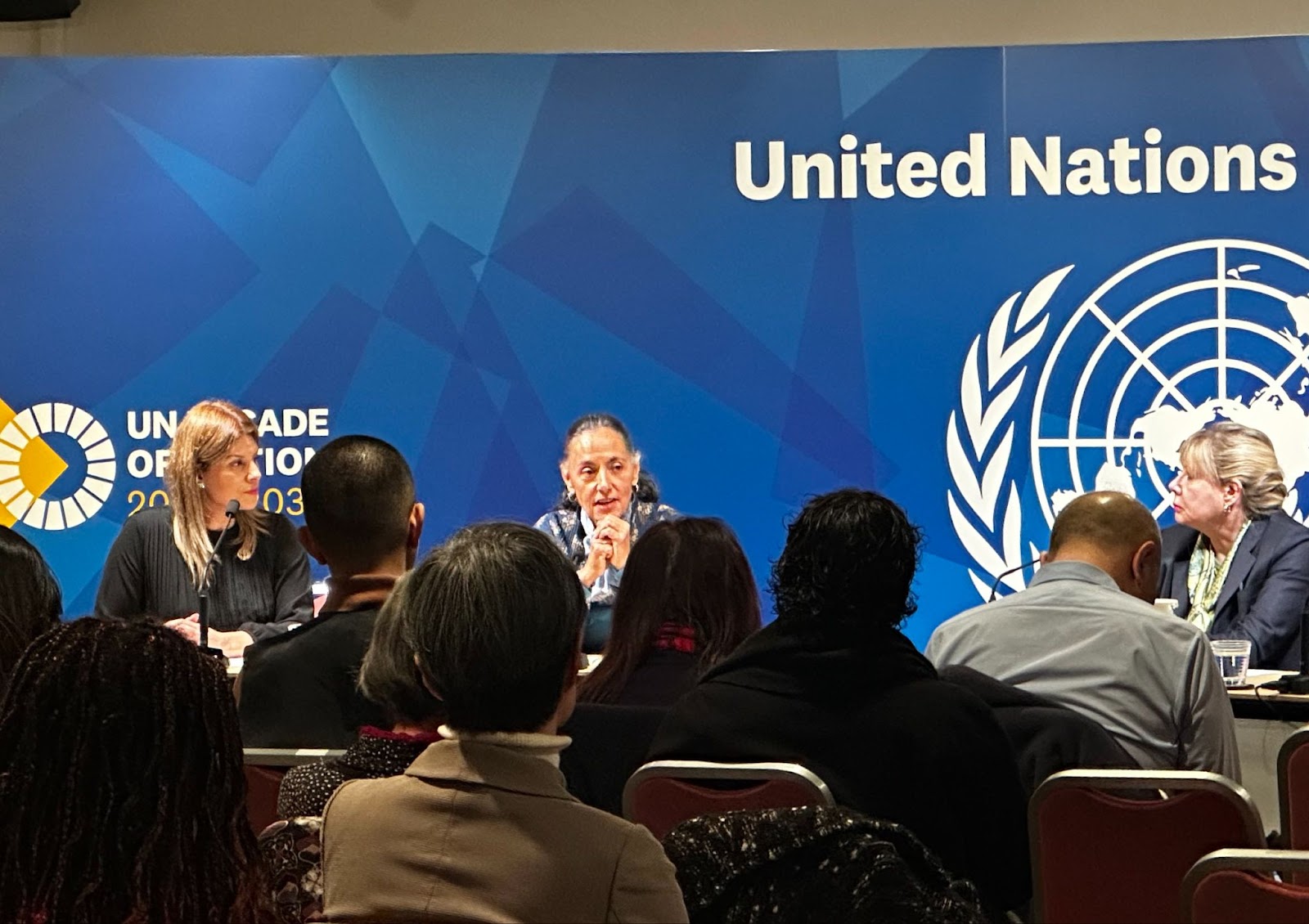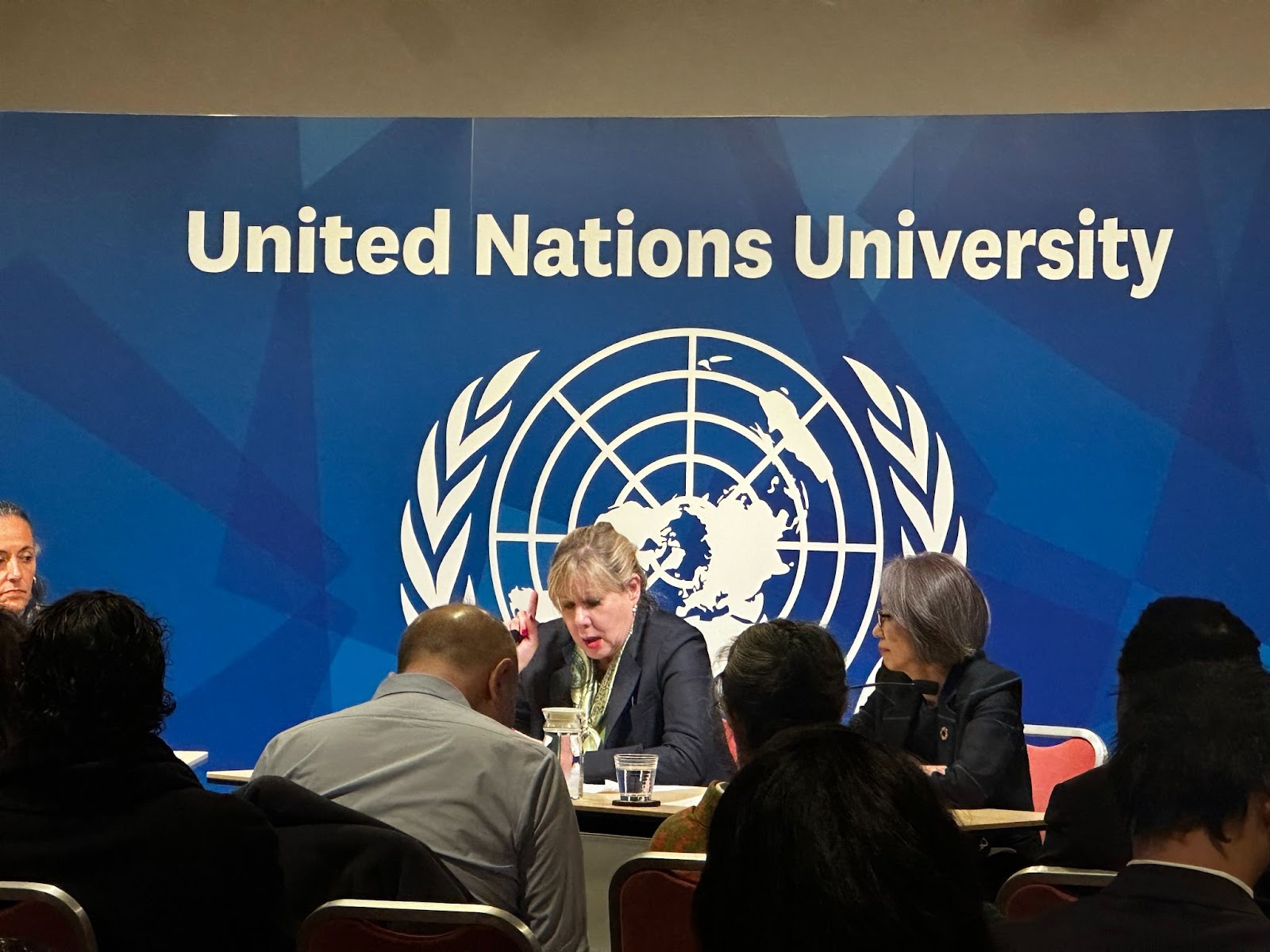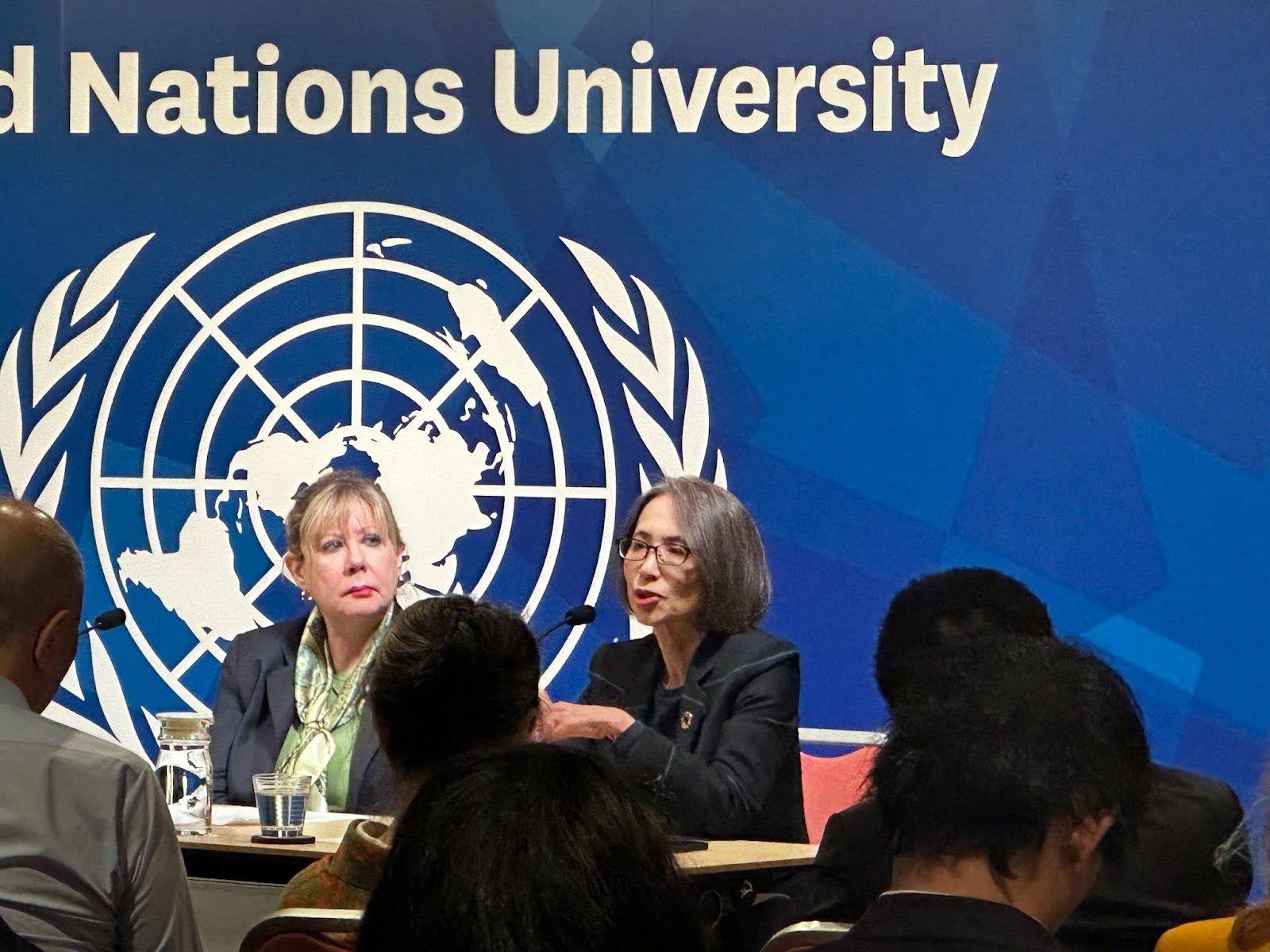Breaking the Silence: Dismantling the Culture That Enables Violence Against Women
On February 6, the United Nations University (UNU) and Guardian Girls International (GGI), in partnership with KIF Japan, co-hosted a pivotal panel discussion on women’s empowerment. Titled “Women in Peace: Strengthening Economies to Address Violence Against Women,” the event explored strategies for combating gender-based violence through economic empowerment and policy reform, and the role we all share in preparing young girls and boys for a better future.
The panel featured three key speakers: Ambassador of Mexico to Japan Melba Pría; Chargé d’affaires ad interim of South Africa to Japan Annelize Schroeder; and UNU Senior Vice-Rector Sawako Shirahase. Each panelist provided insights into the current state of violence against women in their respective countries.
The event commenced with opening remarks from Tshilidzi Marwala, Rector of UNU and Under-Secretary-General of the United Nations, and Shin Koyamada, Chairman of KIF Japan and Guardian Girls International. Rector Marwala emphasized the urgency of transforming the systems that perpetuate violence against women, stating, “We are fighting for a world where women’s and girls’ voices are not only heard but lead the charge for positive change.”
The Global Crisis of Gender-Based Violence
Ambassador Pría painted a stark picture of gender-based violence in Mexico, revealing that 70% of women aged 15 and above have experienced some form of violence. “This is a lot of violence against women,” Ambassador Pría stated bluntly. “In my country, in a country where there is no war, in a country that is a normal, middle income country, in a country where we have a woman president… Women in my country are empowered, but the machismo and the patriarchal society has made it very easy for men to think that they have the might to not only kill but be violent to women.”

Chargé d’affaires Schroeder highlighted South Africa’s alarming rates of violence against women. “We have a situation, a social situation, where there is unfortunately a lot of violence against women. Unacceptably so,” she said. “We are very proud and often say that South Africa’s constitution is one of the most liberal in the world, because it provides for the rights of women… But yet, why is it that we see this terror against women?”
In 2019 a wave of gender-based violence and femicide (GBVF) sparked national protests in South Africa following the murder of student Uyinene Mrwetyana. In response, the South African government declared GBVF a national crisis. While initiatives such as the Department of Women, Youth and People with Disabilities were established as early as 2009, they proved insufficient. “That was not enough. We could not see how this impacted positively on a number of occasions,” said Schroeder.
Beyond the human toll, the crisis also carries economic consequences, affecting both victims and society at large. “It comes at a loss for our economy. It comes at a loss for the person who is the victim of gender-based violence,” said Schroeder. Addressing this crisis, she argued, requires a global effort. “We need international partners. We need each other to learn from each other to see how we can address this issue.”

Senior Vice-Rector Shirahase shed light on Japan’s persistent gender gap, which extends beyond the labor market into family dynamics. She noted that while Japan has made strides in promoting women’s workforce participation, gender norms continue to create barriers to true equality. Japan continues to grapple with a significant gender gap, not only in the labor market but also within families—a space traditionally assumed to be safe and secure. “Families are quite a private sphere, and people believe that families are a very safe place,” she said. This assumption has been challenged by rising domestic violence cases, particularly during the COVID-19 pandemic, when concerns about domestic violence escalated among policymakers and researchers. Despite efforts to study the issue, violence within families remains difficult to quantify. “Some studies are showing 30%, some studies showing 80%,” Shirahase noted. The lack of clarity extends beyond domestic violence to wider harassment issues.
Economic Empowerment as a Solution
A key focus of the panel discussion was how economic independence can serve as a powerful tool in reducing gender-based violence. The panelists discussed various initiatives aimed at empowering women through education, entrepreneurship and workforce participation.
Ambassador Pría emphasized that economic empowerment must start early, with education programs that promote gender equality among both boys and girls. “We think that we have to empower women when they are already adults. We have to start education for women when they are girls, and we have to start education for boys about this issue,” she said.
Mexico has implemented policies such as increased financial aid for female students and daycare provisions funded through social security contributions to enable working mothers to remain in the workforce. Additionally Mexico has introduced laws to protect women, but Ambassador Pría emphasized that legal measures alone are not enough. “Every country has laws…to protect women. But it’s not only the laws,” she stated. The Mexican government has implemented a comprehensive program called “Prevention, Protection and Prosecution,” focusing on preventing violence, offering protection to victims and prosecuting offenders. Despite these efforts, a study revealed that 15 municipalities in Mexico account for 42% of violence against women, underscoring the challenges that remain. “A lot of work is put into these 15 municipalities, but it happens anyway,” she explained.
Ambassador Schroeder expressed strong agreement with the importance of empowering women from a young age, drawing from her personal experience in South Africa. She shared how, prior to 1994, women earned less than their male counterparts despite performing the same work. “Until 1994, I had less money than my male counterpart… there was a salary scale for women, a salary scale for me. How is that possible?” she recalled. However, she noted that after 1994, significant progress was made, with women now being paid equally. Reflecting on South Africa’s progress, she emphasized that the country’s economic transformation cannot happen without the participation of women and girls.
In 2023 President Cyril Ramaphosa hosted African Union leaders for a discussion on positive masculinity, underscoring that “we cannot win this if the boys and the men do not come with us on this path forward.” Schroeder also praised the positive shift in economic opportunities for women, including a women-only wine estate, and the growing presence of women in traditionally male-dominated industries such as car dealerships.
Senior Vice-Rector Shirahase spoke of one of Japan’s most pressing challenges: the persistent gendered decision of labor, which has not significantly improved despite policies encouraging women to work and pursue higher education. “Japan is kind of a not-clear society in some ways, and it’s not that easy to find exactly what happened,” she acknowledges. The country’s structural barriers continue to limit progress on gender equality, and the reality of gender-based violence often remains hidden.

While the focus is often on violence against women and girls, she also stresses that “we shouldn’t forget violence against boys.” The fight for gender equality must acknowledge all those negatively affected by patriarchal society, which often includes young boys.
Changing the Narrative for Girls and Boys
While empowering young girls is crucial, it cannot be where the conversation stops. Encouraging confidence, resilience and ambition in girls is necessary, but if they continue to grow up in a world where men hold the power to silence, harm and dismiss them, that empowerment will always have limits.
Instead, dismantling the systems that sustain gender-based violence must become the priority. This means ensuring that affirmative action policies don’t just place women in leadership positions but actively challenge the biases that prevent them from being seen as respected, legitimate leaders. It means shifting the focus from teaching women how to protect themselves to holding men accountable for the violence they commit. It means breaking down the legal, social and economic barriers that keep women trapped in cycles of abuse.
All three panelists emphasized that this is not a fight women should have to carry alone. If gender-based violence is to be eradicated, men must take responsibility for their role. Above all, representation matters, for both young girls and boys.
Ambassador Melba said, “I am very happy to see many men in the audience,” said Ambassador Melba toward the end of the panel. “It is important that we take up role models. Role models of women that are leaders, role models of women that are outspoken … and also role models of men. It is important that we take a broader coalition for change. And that’s where I want to go.”

